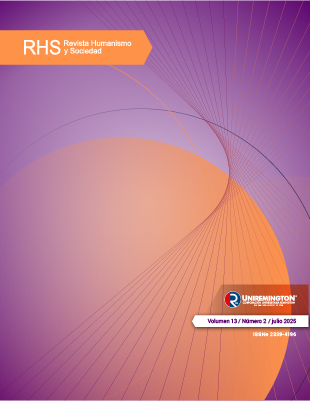Identifying Power Skills and Negotiation Competencies in Secondary Education Students: The Integrado Educational Institution in Cómbita
Main Article Content
Abstract
The personal development of young secondary school students is essential for their social integration and professional success. In this regard, the inclusion of soft skills in the educational process has become increasingly important. However, these skills are not always formally addressed within the curriculum. The objective of this study, therefore, was to identify training needs in power skills and negotiation competencies among tenth- and eleventh-grade students at the Integrado Educational Institution in Cómbita, with the aim of designing a relevant educational module. The research followed a quantitative and descriptive approach, employing structured surveys administered to all tenth- and eleventh-grade students, as well as to grade directors, academic coordinators, and counselors at the institution. The findings indicate thar while students demonstrate moderate development of skills such as teamwork, they show significant weaknesses in negotiation and conflict resolution. Teachers, on the other hand, perceive limited development in core areas such as leadership and communication. This divergence underscores the importance of designing and implementing a training module that strengthens soft skills through practical strategies—simulations and role-playing activities—fostering more intentional and collaborative learning aligned with the demands of contemporary social and professional environment.
Downloads
Article Details

This work is licensed under a Creative Commons Attribution-NonCommercial-ShareAlike 4.0 International License.
Those authors who publish with this journal agree to the following terms:
The designated authors will retain copyright of all papers and grant the journal the right of first publication of their work, which will be simultaneously published under the Creative Commons Attribution License that allows third parties to share the work, as long as its author is attributed and this journal is identified as the original publisher.
Authors may enter into separate, additional non-exclusive licensing agreements for the distribution of the published work (e.g., post it to an institutional telematic archive or publish it in a monographic volume) as long as this journal is acknowledged as the original publisher.
References
Alvarez-Bolaños, E. (2020). Educación Socioemocional. Controversias y Concurrencias Latinoamericanas, 11(20), 388-408.
Arango Benítez, P. A., Orjuela Roa, C. H., Buitrago Roa, A. F., & Lesmes Martínez, O. M. (2024). Importancia de las habilidades socioemocionales en la educación: una revisión documental. RHS-Revista Humanismo y Sociedad, 12(2), 1-26. https://doi.org/10.22209/rhs.v12n2a05 DOI: https://doi.org/10.22209/rhs.v12n2a05
Arias Gonzáles, J. L. (2021). Diseño y Metogología de la Investigación. Enfoques Consulting Eirl.
Cabrera, K. (2021). Institucionalización de la Educación Media en Colombia (1903-1976). [Tesis de doctorado]. Doctorado Interinstitucional en Educación, Universidad Pedagógica Nacional. http://repository.pedagogica.edu.co/bitstream/handle/20.500.12209/17258/institucionalizacion_de_la_educacion_media_en_colombia.pdf?sequence=1&isAllowed=y
Comisión Económica para América Latina y el Caribe (CEPAL). (2020). Educación, juventud y trabajo: Habilidades y competencias necesarias en un contexto cambiante. Publicación de las Naciones Unidas.
Garavito-Hernández, Y., Villamizar-Mancilla, A. F., & Castañeda-Villamizar, L. P. (2024). Importancia de las habilidades blandas en el contexto laboral: una revisión de la literatura académica. Innova research journal, 9(3), 2-20. https://doi.org/10.33890/innova.v9.n3.2024.2531 DOI: https://doi.org/10.33890/innova.v9.n3.2024.2531
Gómez-Gamero, M. E. (2019). Las habilidades blandas competencias para el nuevo milenio. DIVULGARE Boletín Científico de la Escuela Superior de Actopan, 6(11), 1-5. https://doi.org/10.29057/esa.v6i11.3760 DOI: https://doi.org/10.29057/esa.v6i11.3760
Guevara-Alban, G. P., Verdesoto-Arguello, A. E., & Castro-Molina, N. E. (2020). Metodologías de investigación educativa (descriptivas, experimentales, participativas, y de investigación-acción). Revista Recimundo, 4(3), 163-173. https://doi.org/10.26820/recimundo/4.(3).julio.2020.163-173 DOI: https://doi.org/10.26820/recimundo/4.(3).julio.2020.163-173
Hernández Flores, Y., González Peraza, B. de la C., Quintana Soto, M., Sánchez Borges, Y., & Rodríguez González, M. (2021). Estrategias para el desarrollo de habilidades de negociación en los directivos y sus reservas de la agencia Viajes Cubanacán. Universidad Y Sociedad, 13(2), 87–99.
Lozano Fernández, M. A., Lozano Fernández, E. N., & Ortega Cabrejos, M. Y. (2022). Habilidades blandas una clave para brindar educación de calidad: revisión teórica. Revista Conrado, 18(87), 412–420.
Muñoz de Luna, Á. B. & Martín Gómez, S. (2024). Power skills. Habilidades, conocimientos, aptitudes y actitudes que hacen personas. ESIC Editorial.
Musicco, G. (2018). Soft skills & coaching: motor de la Universidad en Europa. Revista Universitaria Europea, 29, 115-132. https://doi.org/10.24137/RAEIC.11.22.4 DOI: https://doi.org/10.24137/raeic.11.22.4
Nuñez-Lira, L. A., Alfaro Bernedo, J. O., Aguado Lingan, A. M., & González Ponce de León, E. R. (2023). Toma de decisiones estratégicas en empresas: Innovación y competitividad. Revista Venezolana De Gerencia, 28(9), 628-641. https://doi.org/10.52080/rvgluz.28.e9.39 DOI: https://doi.org/10.52080/rvgluz.28.e9.39
Organización Internacional del Trabajo (OIT). (2023). Panorama de Empleo Juvenil en Colombia 2016-2023. Oficina Internacional del Trabajo.
Robles Robles, A. (2019). La formación del pensamiento crítico: habilidades básicas, características y modelos de aplicación en contextos innovadores. Revista de Ciencias Humanísticas y Sociales (ReHuSo), 13-24. DOI: https://doi.org/10.33936/rehuso.v4i2.2128
Romero González, J. A., Granados, I. N., López Clavijo, S. L., & González Ruiz, G. M. (2021). Habilidades blandas en el contexto universitario y laboral: revisión documental. Inclusión Y Desarrollo, 8(2), 113-127. https://doi.org/10.26620/uniminuto.inclusion.8.2.2021.2749 DOI: https://doi.org/10.26620/uniminuto.inclusion.8.2.2021.2749
Rosales Llontop, R., Guizado Oscco. F., Salvatierra Melgar, A., Juño Príncipe, K. M., & Mescua Figueroa, C. (2020). Programa de desarrollo personal para el desarrollo de habilidades sociales en los estudiantes de secundaria. (2020). PsiqueMag, 9(1), 102-117. https://doi.org/10.18050/psiquemag.v9i1.2497 DOI: https://doi.org/10.18050/psiquemag.v9i1.2497
Ruiz Aguirre, E. I., Martínez de la Cruz, N. L., & Galindo González, R. M. (2023). El trabajo en equipo y la colaboración como habilidades blandas para la formación de la ciudadanía democrática. LATAM Revista Latinoamericana De Ciencias Sociales Y Humanidades, 4(5), 368–378. https://doi.org/10.56712/latam.v4i5.1323 DOI: https://doi.org/10.56712/latam.v4i5.1323
Serpa Ramírez, A. (2024). El Fenómeno de las Habilidades Blandas en los Estudiantes de Educación Media de la Institución Educativa Nueva Granada, sede San Diego del Municipio de Dosquebradas [Tesis de Especialización, Universidad Católica de Pereira]. Repositorio Universidad Católica de Pereira – RIBUC.
Veytia Bucheli, M. G., & Cárdenas Mata, S. (2023). Habilidades blandas y la web 2.0 en la educación secundaria. Emerging Trends in Education, 5(10), 58-67. https://doi.org/10.19136/etie.a5n10.5078 DOI: https://doi.org/10.19136/etie.a5n10.5078
Villanueva Marcial , Y. M., Chirinos Lechuga , R., Guzmán Zarate, V. H., & Salas Carlock, S. (2024). Importancia del Desarrollo de Habilidades Blandas en Estudiantes de Nivel Superior. Revista Ciencia Latina Revista Científica Multidisciplinar, 8(1), 11010-11031. https://doi.org/10.37811/cl_rcm.v8i1.10413 DOI: https://doi.org/10.37811/cl_rcm.v8i1.10413
Zambrano-Chamba, M., Vallejo-Piza, G., & Tafur-Méndez, F. (2023). Habilidades blandas como complemento para la formación profesional de los estudiantes. Digital Publisher CEIT, 8(3), 257-267. https://doi.org/10.33386/593dp.2023.3.1627 DOI: https://doi.org/10.33386/593dp.2023.3.1627
